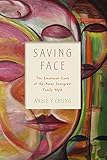Saving Face : The Emotional Costs of the Asian Immigrant Family Myth / Angie Y. Chung.
Material type: TextSeries: Families in FocusPublisher: New Brunswick, NJ : Rutgers University Press, [2016]Copyright date: ©2016Description: 1 online resource (256 p.)Content type:
TextSeries: Families in FocusPublisher: New Brunswick, NJ : Rutgers University Press, [2016]Copyright date: ©2016Description: 1 online resource (256 p.)Content type: - 9780813569833
- 9780813569833
- 973/.0495 23
- E184.A75 C5165 2016
- E184.A75 C5165 2016
- online - DeGruyter
- Issued also in print.
| Item type | Current library | Call number | URL | Status | Notes | Barcode | |
|---|---|---|---|---|---|---|---|
 eBook
eBook
|
Biblioteca "Angelicum" Pont. Univ. S.Tommaso d'Aquino Nuvola online | online - DeGruyter (Browse shelf(Opens below)) | Online access | Not for loan (Accesso limitato) | Accesso per gli utenti autorizzati / Access for authorized users | (dgr)9780813569833 |
Browsing Biblioteca "Angelicum" Pont. Univ. S.Tommaso d'Aquino shelves, Shelving location: Nuvola online Close shelf browser (Hides shelf browser)

|

|

|

|

|

|

|
||
| online - DeGruyter Trafficked Children and Youth in the United States : Reimagining Survivors / | online - DeGruyter Battleground New Jersey : Vanderbilt, Hague, and Their Fight for Justice / | online - DeGruyter Police, Power, and the Production of Racial Boundaries / | online - DeGruyter Saving Face : The Emotional Costs of the Asian Immigrant Family Myth / | online - DeGruyter The Methamphetamine Industry in America : Transnational Cartels and Local Entrepreneurs / | online - DeGruyter It's Not Your Fault! : Strategies for Solving Toilet Training and Bedwetting Problems / | online - DeGruyter Movie Migrations : Transnational Genre Flows and South Korean Cinema / |
Frontmatter -- Contents -- Preface and Acknowledgments -- 1. The Asian Immigrant Family Myth -- 2. Education, Sacrifice, and the "American Dream" -- 3. Love and Communication across the Generation Gap -- 4. Children as Family Caregivers -- 5. Daughters and Sons Carrying Culture -- 6. The Racial Contradictions of Being American -- 7. Behind the Family Portrait -- Appendix A -- Appendix B -- Notes -- Index -- About the Author
restricted access online access with authorization star
http://purl.org/coar/access_right/c_16ec
Tiger Mom. Asian patriarchy. Model minority children. Generation gap. The many images used to describe the prototypical Asian family have given rise to two versions of the Asian immigrant family myth. The first celebrates Asian families for upholding the traditional heteronormative ideal of the "normal (white) American family" based on a hard-working male breadwinner and a devoted wife and mother who raises obedient children. The other demonizes Asian families around these very same cultural values by highlighting the dangers of excessive parenting, oppressive hierarchies, and emotionless pragmatism in Asian cultures. Saving Face cuts through these myths, offering a more nuanced portrait of Asian immigrant families in a changing world as recalled by the people who lived them first-hand: the grown children of Chinese and Korean immigrants. Drawing on extensive interviews, sociologist Angie Y. Chung examines how these second-generation children negotiate the complex and conflicted feelings they have toward their family responsibilities and upbringing. Although they know little about their parents' lives, she reveals how Korean and Chinese Americans assemble fragments of their childhood memories, kinship narratives, and racial myths to make sense of their family experiences. However, Chung also finds that these adaptive strategies come at a considerable social and psychological cost and do less to reconcile the social stresses that minority immigrant families endure today. Saving Face not only gives readers a new appreciation for the often painful generation gap between immigrants and their children, it also reveals the love, empathy, and communication strategies families use to help bridge those rifts.
Issued also in print.
Mode of access: Internet via World Wide Web.
In English.
Description based on online resource; title from PDF title page (publisher's Web site, viewed 07. Jan 2021)


